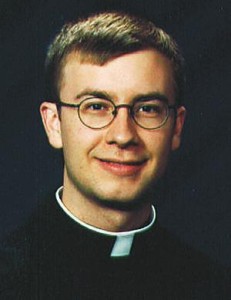By Father Thom Hennen

As backyard gardens begin to flourish and the crops begin to come up across the Iowa countryside, the agriculture images so often used by our Lord in the Gospels always take on a special vividness for me.
In particular, I was thinking recently about the passage from John’s Gospel in which Jesus says, “I sent you to reap what you have not worked for; others have done the work, and you are sharing the fruits of their work” (John 4:38). I was thinking of this because this past April at the diaconate ordination of Jacob Greiner I had the great honor and responsibility of standing up for my first time as the Director of Vocations and attesting to Jacob’s worthiness for holy orders in these words: “After inquiry among the Christian people and upon the recommendation of those responsible, I testify that he has been found worthy.” I will get to say these words again later this month (June 23) for Deacon Corey Close’s ordination to the priesthood.
This is certainly a proud moment for any vocations director. But in both of these cases it is clear that I am privileged to reap what I have not sown. I cannot take any credit for these men’s vocations. This is the work of my predecessors, Father Marty Goetz and (now) Bishop Robert Gruss. I just get to be there when the “crop comes in.” This is very humbling. But it also gives me assurance that while I might not see the fruits of my labors to cultivate vocations, someone else will get to “reap the harvest.”
In my short time as vocations director I have discovered that vocations ministry is a bit like gardening or farming. First of all, there is a lot of “prep work.” There is a lot of “hardened soil” to break up and obstacles to remove before any seed can be planted. There is personal, cultural and sometimes even familial resistance to the idea of placing one’s life totally at the service of the Church. This needs to be broken down, “tilled,” so to speak, before the soil of soul is even minimally receptive to such a notion.
Secondly, there’s a lot of unseen growth and, therefore, a lot of trust that is needed. I think here of the passage from Mark’s Gospel in which Jesus says, “This is how it is with the kingdom of God; it is as if a man were to scatter seed on the land and would sleep and rise night and day and the seed would sprout and grow, he knows not how” (Mark 4:26-28). I do my work to the best of my ability, but I cannot see the inner workings of the heart of someone who is discerning. Truly the seed sprouts and grows, I know not how.
Finally, the work of vocations ministry cannot be done alone. Farmers and gardeners can work their fingers to the bone, but they cannot do everything. They must still depend on God to provide the right conditions (enough rain, enough sun) to make their crops thrive. So too, I have found that I have to rely on God to do what is most properly his work. It is, as Saint Paul says, God who “causes the growth” (cf. 1 Corinthians 3:7).
But also, I must rely on the aid of others. Like a large farming operation, there is simply too much work over too large an area for a single vocations director to “farm” it all. And so, I count on numerous volunteers, my brother priests, youth ministers, directors of religious education, the Serra Club, the Knights of Columbus and local parish vocations committees (among others) to help me break down the soil and sow the seeds of vocations. None of us may ever see the fruit of all that we do, but we trust that our labors will indeed be fruitful.
(Fr. Hennen is vocations director for the Davenport Diocese. Contact him at (563) 888-4255 or hennen@davenportdiocese.org.)







